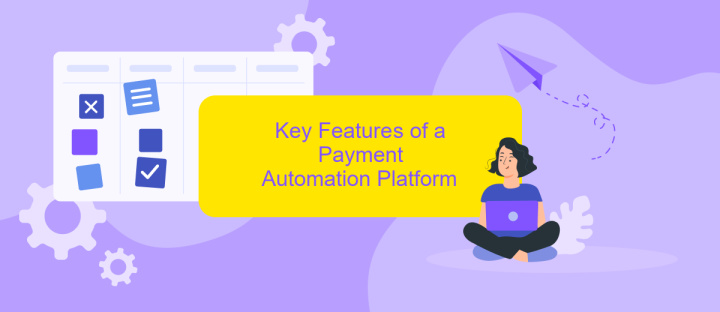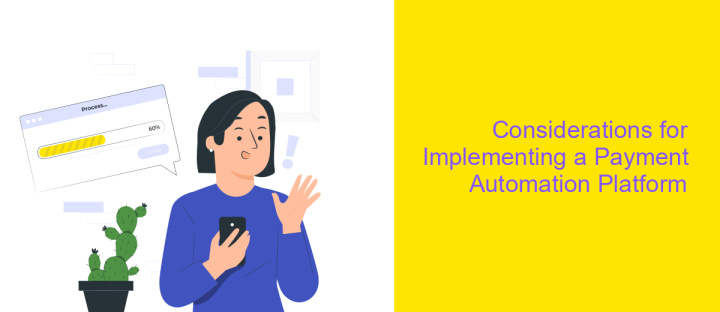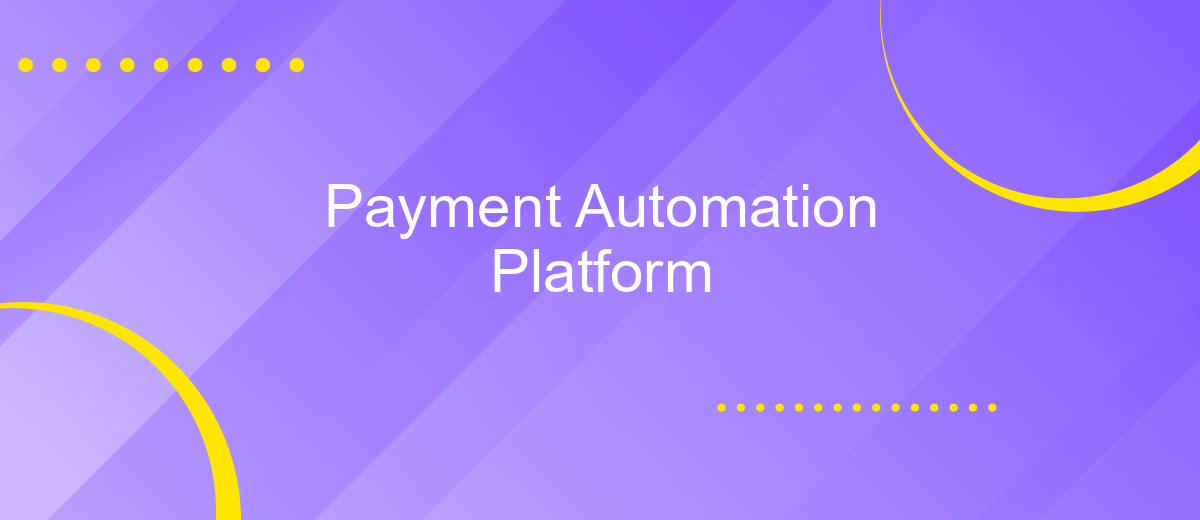Payment Automation Platform
In today's fast-paced digital economy, businesses are increasingly seeking efficient solutions to streamline their financial operations. Payment automation platforms offer a seamless way to manage transactions, reduce manual errors, and enhance overall financial accuracy. By automating payment processes, companies can save time, cut costs, and improve cash flow, ultimately driving better business performance and customer satisfaction.
Introduction
In today's fast-paced digital economy, businesses are increasingly seeking ways to streamline their financial operations. Payment automation platforms have emerged as a crucial tool for achieving this goal, offering numerous advantages over traditional manual payment processes. These platforms not only enhance efficiency but also reduce the risk of errors and fraud, thereby providing a secure and reliable payment solution.
- Improved efficiency and faster transaction processing
- Enhanced security and reduced risk of fraud
- Cost savings through reduced manual labor
- Better cash flow management and financial reporting
- Scalability to accommodate growing business needs
Adopting a payment automation platform can significantly transform the way businesses manage their financial transactions. By automating routine tasks and integrating with existing financial systems, these platforms allow companies to focus on their core activities while ensuring that payments are processed accurately and on time. As a result, businesses can achieve greater operational efficiency and maintain a competitive edge in the market.
Benefits of Payment Automation

Implementing a payment automation platform significantly enhances operational efficiency by streamlining the entire payment process. This reduces manual intervention, thereby minimizing errors and saving valuable time. Automated systems ensure timely payments, improving cash flow management and fostering better relationships with suppliers and vendors. Moreover, these platforms offer real-time tracking and reporting, providing businesses with valuable insights into their financial health.
Another key benefit is the seamless integration with existing financial systems and software. Tools like ApiX-Drive facilitate easy and quick integration, allowing businesses to connect various applications without extensive technical know-how. This ensures that data flows smoothly between systems, enhancing accuracy and reducing the risk of discrepancies. Additionally, automated payment platforms often come with enhanced security features, safeguarding sensitive financial information and ensuring compliance with regulatory standards.
Key Features of a Payment Automation Platform

A Payment Automation Platform streamlines financial operations by automating repetitive tasks and ensuring accuracy in transactions. Businesses benefit from reduced manual intervention, enhanced compliance, and improved cash flow management.
- Automated Invoicing: Generates and sends invoices automatically, reducing the time spent on manual invoice creation.
- Payment Scheduling: Allows businesses to schedule payments in advance, ensuring timely disbursements and avoiding late fees.
- Reconciliation: Automatically matches payments with invoices, simplifying the reconciliation process and reducing errors.
- Fraud Detection: Utilizes advanced algorithms to detect and prevent fraudulent transactions, enhancing security.
- Reporting and Analytics: Provides detailed financial reports and analytics, offering insights into spending patterns and financial health.
By leveraging these key features, businesses can achieve greater operational efficiency, reduce costs, and maintain better control over their financial processes. This leads to a more streamlined workflow and allows finance teams to focus on strategic activities rather than manual tasks.
Considerations for Implementing a Payment Automation Platform

Implementing a payment automation platform requires careful consideration of several factors to ensure a seamless integration and optimal performance. Firstly, it's essential to assess the compatibility of the platform with existing systems and workflows. This includes evaluating the technical requirements, software compatibility, and potential need for custom integrations.
Another critical aspect is security. Payment automation platforms handle sensitive financial data, so robust security measures must be in place. This involves ensuring compliance with industry standards, such as PCI DSS, and implementing strong encryption protocols to protect data integrity and confidentiality.
- Evaluate platform scalability to accommodate future growth.
- Consider the level of customer support and service provided by the vendor.
- Analyze the total cost of ownership, including initial setup, maintenance, and potential hidden fees.
- Examine user interface and ease of use to ensure minimal training requirements.
Lastly, it's crucial to involve key stakeholders in the decision-making process. This includes finance, IT, and operations teams to ensure the chosen platform meets the organization's overall needs and objectives. By addressing these considerations, businesses can achieve a successful implementation and reap the benefits of payment automation.


Conclusion
In conclusion, implementing a Payment Automation Platform can significantly streamline financial operations, reduce human error, and enhance overall efficiency. By automating routine tasks and enabling seamless transactions, businesses can focus on strategic growth rather than mundane processes. The integration of such platforms with existing systems ensures that all financial data is synchronized and up-to-date, providing a comprehensive view of the company's financial health.
For businesses looking to enhance their integration capabilities, services like ApiX-Drive offer valuable solutions. ApiX-Drive simplifies the integration process, allowing for smooth connectivity between different financial systems and applications. This not only accelerates the implementation of the Payment Automation Platform but also ensures that all systems work harmoniously together. Ultimately, adopting a Payment Automation Platform with robust integration support can lead to more efficient financial management and a stronger, more agile business.
FAQ
What is a Payment Automation Platform?
How can a Payment Automation Platform benefit my business?
How do I integrate a Payment Automation Platform with my existing systems?
What types of payments can be automated with a Payment Automation Platform?
Is it secure to use a Payment Automation Platform?
Do you want to achieve your goals in business, career and life faster and better? Do it with ApiX-Drive – a tool that will remove a significant part of the routine from workflows and free up additional time to achieve your goals. Test the capabilities of Apix-Drive for free – see for yourself the effectiveness of the tool.

